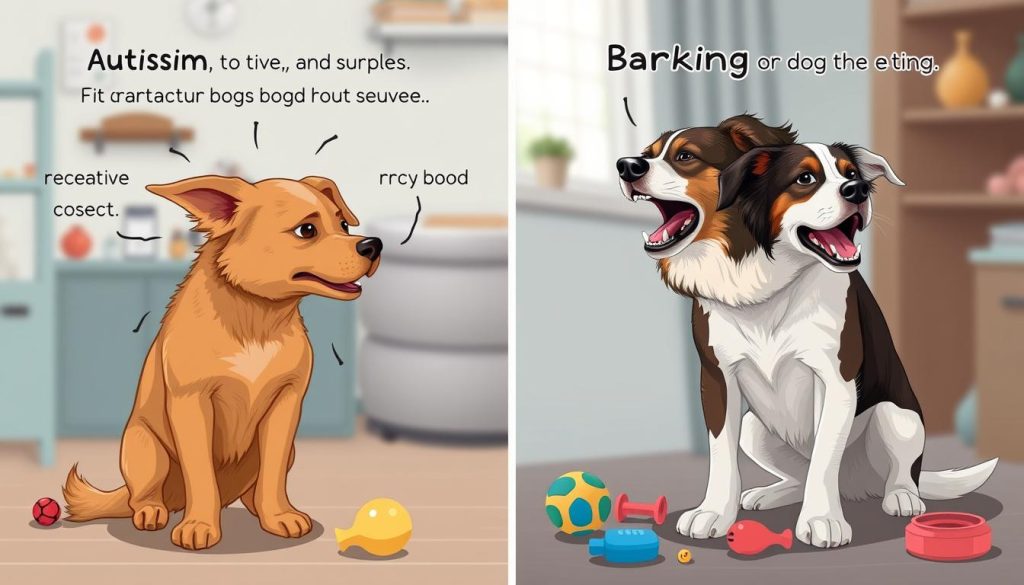Dog owners often wonder if their furry friends can experience conditions similar to humans. One question that comes up is, “Can dogs get autism?” This topic sparks curiosity about canine behavior and possible parallels with human autism spectrum disorders.
While autism in pets isn’t officially recognized, some dogs show behaviors that resemble autism-like traits. These can include social difficulties, repetitive actions, or sensitivity to certain stimuli. Understanding these behaviors is key to providing the best care for our canine companions.
Exploring the possibility of autism in canines opens up a fascinating area of study. It challenges us to look at dog behavior in new ways and consider how we can support our pets’ unique needs. Let’s dive into what science says about this intriguing topic.
Understanding the Concept of Autism in Animals
The idea that animals can have autism is both fascinating and debated. Autism is usually linked to humans, but scientists look into autism-like traits in dogs and other animals. This idea helps us better understand animal behavior and brain development.
The Neurological Basis of Behavioral Differences
Animal brains, like ours, are made up of complex neurons. Differences in these pathways can cause unique behaviors. Some animals might show behaviors similar to autism in humans, like repeating actions or having trouble with social interactions.
Comparing Human and Animal Neural Development
Human and animal brains have similarities but also differences. They develop at different rates and in unique ways. This comparison helps scientists understand how autism-like traits in dogs might be different from human autism.
| Aspect | Human Brain | Dog Brain |
|---|---|---|
| Size (relative to body) | Larger | Smaller |
| Cognitive abilities | More complex | Less complex |
| Social processing | Highly developed | Well-developed |
Scientific Research on Animal Behavior Patterns
Studies on animal behavior give us clues about autism-like traits. Researchers watch how animals interact, communicate, and react to things. This research helps us understand if animals can have autism.
Even though the idea of autism in animals is debated, research keeps uncovering more about animal brains and behavior. Learning about these patterns can help us care for animals with special needs better.
Can Dogs Get Autism: Current Scientific Evidence
Research on autism in dogs is not well-studied. Experts argue if dogs can truly have autism like humans. Dogs might show behaviors that look like autism, but it’s hard to compare because of species differences.
Studies on dogs and autism have given mixed results. Some dogs show signs like repeating actions, trouble with socializing, and being very sensitive. But, these could also be signs of anxiety, past trauma, or genetics.
A key study by the American Veterinary Medical Association looked at 132 Bull Terriers for autism-like traits. Some dogs showed behaviors like repetitive actions and tail-chasing, similar to autism. But, the researchers were careful not to say for sure if dogs have autism based on these signs.
| Behavior | Observed in Autism | Observed in Dogs |
|---|---|---|
| Repetitive movements | Yes | Yes |
| Social interaction difficulties | Yes | Sometimes |
| Sensory sensitivities | Yes | Yes |
| Communication challenges | Yes | Difficult to assess |
Vets say it’s key to look at each dog as an individual if they act strangely. Knowing what each dog needs and helping them is very important. This is true even if we can’t officially say a dog has autism.
Recognizing Behavioral Differences in Dogs
It can be hard to understand dog autism symptoms and signs of autism in dogs. Dogs don’t get autism like humans do, but they can act like it. Let’s look at how to spot these special traits in our pets.
Common Social Interaction Patterns
Dogs with autism-like traits might find social cues hard. They might not look at you, not want to be petted, or not want to play. Some dogs don’t want to be around people or other dogs, preferring to be alone.
Communication and Body Language
Signs of autism in dogs often show in how they talk and act. These dogs might not come when called or understand body language. They could also do the same thing over and over, like chasing their tail or licking their paws.
Response to Environmental Stimuli
Dogs with autism-like traits might react differently to their world. They could be very sensitive to sounds, lights, or textures. Some dogs get upset by small changes or new things in the house. Others might get really into certain toys or activities.
- Unusual reactions to everyday sounds
- Extreme fear or indifference to new situations
- Repetitive behaviors when stressed
- Difficulty adapting to changes in environment
Keep in mind, these behaviors don’t always mean a dog has autism. Many things can cause similar signs. If you see these traits in your dog, it’s best to talk to a vet for advice and care.
Signs That Mimic Autism-Like Behaviors in Dogs
Dogs can act in ways that look like autism. They can’t get autism like humans do, but knowing these signs helps owners care for them better. Let’s look at some behaviors in dogs that might seem autistic.

Dogs with autism-like traits might not look at you or seem uninterested in others. They might not answer when called or not want to play with other dogs. These signs can be mistaken for autism in dogs.
Some dogs repeat actions, like spinning or chasing their tail. They might get really focused on certain things or have strict routines. Even small changes can upset them a lot.
Communication problems are another sign. Dogs might not get commands or social hints from people or other animals. They could also react too much to sounds or touch.
| Behavior | Description |
|---|---|
| Social Avoidance | Lack of interest in interacting with people or other dogs |
| Repetitive Actions | Spinning, tail-chasing, or fixating on objects |
| Communication Issues | Difficulty understanding commands or social cues |
| Sensory Sensitivity | Overreaction to sounds, touch, or visual stimuli |
These behaviors don’t always mean your dog has autism. Many things can affect a dog’s behavior, like genes, environment, and health. If you see these signs, talk to a vet for advice and a check-up.
The Role of Genetics in Canine Behavioral Development
Genetics are key in shaping a dog’s behavior. Some wonder if dogs can get autism, but it’s more complex. Genetic factors affect behavior in many ways, from breed traits to individual personalities.
Hereditary Factors Affecting Dog Behavior
A dog’s genes can shape their temperament, learning, and social skills. These inherited traits are the base of their behavior. But, environment and training also matter. Knowing these genetic influences helps us understand why some dogs might act like they have autism.
Breed-Specific Behavioral Traits
Different dog breeds have unique behaviors. For example, herding breeds want to gather and control. Retrievers love water and fetching. These traits, from selective breeding, can be mistaken for autism in dogs.
Genetic Testing and Research
Genetic testing is uncovering more about dog behavior. Scientists are finding links between genes and behavior, including autism-like traits. This research helps us grasp how genetics and behavior interact in our pets.
| Behavioral Trait | Possible Genetic Influence | Common in Breeds |
|---|---|---|
| High Energy | Dopamine receptor genes | Border Collie, Jack Russell Terrier |
| Calmness | Serotonin transporter gene | Basset Hound, Great Dane |
| Sociability | Oxytocin receptor gene | Labrador Retriever, Golden Retriever |
Genetics greatly shape dog behavior, but remember, each dog is unique. If you’re worried about your pet’s behavior, talk to a vet. They can figure out if it’s breed-specific, due to allergies, or something else.
Environmental Factors Influencing Dog Behavior
Dog behavior is shaped by many environmental factors. These can contribute to autism-like traits in dogs. A dog’s surroundings play a big role in how they act and interact. From early life experiences to daily routines, everything affects a dog’s behavior.

Early socialization is key. Puppies need positive interactions with people, other animals, and new situations. Without this, they may develop fears or unusual behaviors. Some might wonder if these behaviors mean animals can have autism. While not the same as human autism, dogs can show similar traits.
Living conditions matter too. Dogs in noisy or stressful homes may become anxious or withdrawn. This can look like autism-like traits in dogs. Calm, stable environments help dogs feel secure and behave normally.
Diet and exercise also affect behavior. A poor diet can lead to health issues that change how a dog acts. Lack of exercise can cause excess energy and odd behaviors. Regular vet check-ups can catch health problems that might be mistaken for behavioral issues.
| Environmental Factor | Potential Impact on Behavior |
|---|---|
| Early Socialization | Develops social skills, reduces fear |
| Living Conditions | Affects stress levels, anxiety |
| Diet and Exercise | Influences energy levels, overall health |
| Routine | Provides stability, reduces anxiety |
Understanding these factors helps dog owners create better environments for their pets. It’s important to remember that while some behaviors might seem unusual, they don’t always mean a dog has autism-like traits. Each dog is unique and responds differently to their environment.
Early Development and Socialization Impact
The early years of a dog’s life are key to their behavior. Knowing these stages helps owners spot and fix issues, like signs of autism in pets.
Critical Periods in Puppy Development
Puppies go through important stages as they grow. These stages shape their social skills and how they react to their surroundings. What happens during these times can affect their behavior for life.
| Developmental Stage | Age Range | Key Developments |
|---|---|---|
| Neonatal Period | 0-2 weeks | Sensory development begins |
| Transitional Period | 2-3 weeks | Eyes open, walking starts |
| Socialization Period | 3-12 weeks | Critical for social skills |
| Juvenile Period | 3-6 months | Continued learning and growth |
Importance of Early Experiences
Early experiences shape a puppy’s brain and behavior. Positive interactions during these times can prevent behaviors like canine autism. Expose puppies to different sights, sounds, and textures to boost confidence.
Social Learning in Young Dogs
Young dogs learn by watching and interacting with others. This helps them develop good social skills. Puppies missing out on these experiences may show signs like autism. Regular playdates with other dogs and people support healthy social development.
Distinguishing Between Autism-Like Traits and Other Conditions
It’s hard to tell if a dog has autism. Many behaviors that look like autism might be from other issues. Pet owners need to know the differences to help their pets.

Dogs with anxiety or sensory problems might act like they have autism. They might avoid eye contact, repeat actions, or be sensitive to touch. But, these signs don’t always mean a dog has autism.
Other things can look like autism in dogs, such as:
- Canine cognitive dysfunction
- Hearing or vision impairments
- Neurological disorders
- Thyroid imbalances
If your dog acts strangely, see a vet. They can check for health problems and help you next. Early action is important for any behavior issues.
Even though experts disagree on dog autism, knowing your pet’s needs is vital. Watch your dog closely and get help when needed. This way, you can give them the best care and support.
Professional Assessment and Diagnosis Options
When you worry about autistic behaviors in dogs, getting a professional check is key. Veterinarians and animal behaviorists are vital in figuring out if a dog might have autism-like traits.
Veterinary Behavioral Evaluation
A detailed vet exam is the first step in diagnosing autism in dogs. Vets watch how the dog acts, look at its health history, and do physical checks. This helps rule out other health problems that might look like autism.
Diagnostic Tools and Methods
Vets use different tools to check for autistic behaviors in dogs. These include:
- Behavioral questionnaires for owners
- Observational tests in controlled environments
- Video analysis of the dog’s interactions
- Cognitive function assessments
When to Seek Professional Help
It’s time to see a vet if your dog shows signs like:
| Behavior | Description |
|---|---|
| Social withdrawal | Avoiding interaction with humans or other dogs |
| Repetitive actions | Excessive tail-chasing or pacing |
| Sensory sensitivity | Overreacting to sounds, touch, or visual stimuli |
| Communication difficulties | Lack of eye contact or unusual vocalizations |
Getting help early is important for managing autism-like behaviors in dogs. If you see these signs, contact a vet behaviorist. They can do a full check and create a support plan just for your dog.
Supporting Dogs with Behavioral Differences
Dogs with behavioral differences, like signs of autism, need special care. Pet owners can help their furry friends thrive by creating a supportive environment. Understanding autism in pets is key to providing the right support.
A calm, predictable routine helps dogs with behavioral challenges. Set regular times for meals, walks, and playtime. This structure can reduce anxiety and improve overall well-being. Consistency is very important for dogs with autism-like traits.

Create a safe space for your dog. This quiet area should be free from loud noises and bright lights. It gives your pet a retreat when feeling overwhelmed. For dogs showing signs of autism, this space can be a lifesaver during stressful times.
Positive reinforcement works wonders. Reward good behavior with treats, praise, or toys. This encourages desired actions and builds confidence. Be patient and celebrate small victories.
| Support Strategy | Benefits |
|---|---|
| Consistent Routine | Reduces anxiety, improves predictability |
| Safe Space | Provides comfort, manages stress |
| Positive Reinforcement | Encourages good behavior, builds confidence |
Remember, each dog is unique. What works for one may not work for another. Observe your pet closely and adjust your approach as needed. With patience and understanding, you can help your dog lead a happy, fulfilling life despite behavioral differences.
Training Approaches for Dogs with Special Needs
Dogs with autism-like behaviors need special training. These methods help manage their behaviors and improve their life. Let’s look at effective training strategies for dogs with special needs.
Positive Reinforcement Techniques
Positive reinforcement is key for training dogs with autism-like traits. Reward good behavior with treats, praise, or toys. This encourages desired actions and builds trust. Avoid punishment, as it can increase anxiety in sensitive dogs.
Creating Routine and Structure
Dogs with autism in canines thrive on predictability. Create a consistent daily routine for feeding, walks, and playtime. This helps reduce anxiety and provides a sense of security. Use visual cues or signals to indicate transitions between activities.
Adapting Training Methods
Each dog is unique, so tailor your approach to their needs. Some may respond better to hand signals than verbal commands. Others might prefer shorter training sessions to avoid overstimulation. Be patient and flexible in your methods.
| Training Approach | Benefits | Examples |
|---|---|---|
| Positive Reinforcement | Builds confidence, reduces anxiety | Treats, praise, favorite toys |
| Routine and Structure | Provides predictability, reduces stress | Consistent mealtimes, scheduled walks |
| Adapted Methods | Caters to individual needs | Visual cues, shorter sessions |
Remember, professional guidance is invaluable when training dogs with special needs. Autism service dog organizations offer resources and support for families dealing with autism in canines. With patience and the right approach, you can help your special needs dog thrive.
The Impact of Diet and Nutrition on Behavior
Diet is key in shaping a dog’s behavior. When we talk about if dogs can get autism, we must look at how food affects their brain. Studies show that changing what dogs eat might help with autism-like traits.

A diet full of omega-3 fatty acids, antioxidants, and vitamins is good for a dog’s brain. These nutrients can lower anxiety and help dogs focus better if they act like they have autism.
Some research links food allergies or sensitivities to bad behavior in dogs. Taking out common allergens like wheat, soy, or dairy might help dogs with autism-like symptoms.
| Nutrient | Potential Behavioral Benefits | Food Sources |
|---|---|---|
| Omega-3 fatty acids | Reduced anxiety, improved cognitive function | Fish oil, flaxseed |
| Antioxidants | Enhanced brain health, reduced inflammation | Blueberries, sweet potatoes |
| B-complex vitamins | Improved mood regulation, stress management | Lean meats, eggs |
While diet can’t cure or stop autism-like behaviors in dogs, it can make a big difference. Talk to a vet to make a special diet plan for dogs with odd behaviors.
Creating a Supportive Home Environment
For dogs with autism-like traits, a calm home is key. A quiet and nurturing space can greatly help. Start by setting up a quiet area for your dog to go when feeling stressed.
Keep routines for feeding, walks, and playtime the same every day. Dogs with autism like knowing what to expect. Use soft lights and avoid loud sounds to help them feel less overwhelmed. Puzzle toys and interactive feeders can keep their minds busy in a fun way.
Make your home fit your dog’s needs. You might need to block off busy spots or create cozy spots with blankets and toys. Every dog is different, so watch what they like and change things as needed. With patience and understanding, you can create a safe and loving space for your dog.
FAQ
Q: Can dogs actually get autism?
A: Dogs can show behaviors that seem like autism, but they can’t be officially diagnosed with it. These behaviors might look like autism symptoms, but they often come from other issues.
Q: What are some signs that might be mistaken for autism in dogs?
A: Signs that might look like autism in dogs include repetitive actions, trouble with social interactions, and unusual reactions to sounds or sights. These can also be signs of other health problems. Always check with a vet to figure out what’s going on.
Q: How can I tell if my dog has autism-like behaviors?
A: Dogs can’t get autism, but they might act like it. They might avoid eye contact, not answer when called, or repeat actions. If you see these signs often, talk to a vet behaviorist for help.
Q: Are certain dog breeds more prone to autism-like behaviors?
A: No scientific proof shows that some breeds get autism more than others. But, some breeds might act differently that could be mistaken for autism. It’s key to understand each dog’s unique traits and behavior.
Q: Can environmental factors contribute to autism-like behaviors in dogs?
A: Yes, a dog’s environment can affect its behavior. Lack of socialization, scary experiences, or stress can make dogs act like they have autism. A supportive and enriching environment is vital for a dog’s well-being.
Q: How are autism-like behaviors in dogs diagnosed?
A: Dogs can’t be officially diagnosed with autism. But, if a dog’s behavior is concerning, a vet behaviorist can evaluate it. They’ll watch the dog’s behavior, look at its health history, and might do tests to find other health issues.
Q: What treatment options are available for dogs with autism-like behaviors?
A: Dogs with autism-like behaviors can be treated with behavior changes, managing their environment, and sometimes medicine. Training with positive reinforcement, setting routines, and keeping a calm space can help. A vet might also prescribe medicine for specific symptoms.
Q: Can diet affect autism-like behaviors in dogs?
A: Diet doesn’t directly cause autism-like behaviors in dogs, but it can affect their mood and health. Some dogs might need dietary changes if they have food allergies or sensitivities. Always talk to a vet before changing your dog’s diet.
Q: How can I support a dog with autism-like behaviors?
A: Supporting a dog means creating a stable, predictable space, using positive training, and giving them mental and physical activities. Working with a vet to create a plan tailored to your dog’s needs is also important.
Q: Is there ongoing research about autism in dogs?
A: Yes, research is ongoing to understand dogs’ behaviors and how they might relate to human autism. But, this area is new, and more studies are needed to fully grasp the connection between human and canine neurodevelopmental conditions.


















